Information in the review is provided as of November 1, 2023
Summary
In October, the general activity of the Belarusian Armed Forces didn’t change significantly. During the month, a combat readiness inspection was held, in which all mechanized formations of the Belarusian Armed Forces were involved. The fall conscription shows that it is possible to maintain the number of conscripts at the current level only by reducing health requirements. Due to the end of the academic year, no major military drills will be held in the troops in the coming month.
The activity of the Russian Armed Forces didn’t change in October. There may be about 2000 servicemen of the Russian Armed Forces in Belarus, who are not part of the regional group of troops. In general, military activity of the Russian Armed Forces in Belarus can be characterized as very low. At the same time, a slight increase in the number of the aviation group of the Russian Aerospace Forces was noted. Its composition doesn’t pose serious security threats to the countries neighboring Belarus.
The number of PMC Wagner mercenaries in Belarus continued to decrease in October and may amount to about 500 people as of early November. There was no significant activity of the mercenaries. There are reasons to believe that only instructors may remain in Belarus in the near future, who will continue to train the security forces of the Lukashenko regime, as well as a significant number of mostly light vehicles.
The general medium-term forecast of the military situation in Belarus remains the same: there is no reason to expect an offensive of the Russian Armed Forces from the territory of Belarus, as well as an increase in its military presence. The importance of PMC Wagner as a destabilizing factor will continue to decrease.
1. Armed Forces of the Republic of Belarus
1.1. Organization of combat training.
October was full of combat training activities of the Belarusian Armed Forces. It was reported that field drills were conducted with units of the Signal Troops and the 103rd Airborne Brigade, tactical-special training in the 38th Air Assault Brigade (the training focused on small group operations, interchangeability, and combat operations in urban conditions), tactical drills in the 147th Anti-Aircraft Missile Regiment, tactical drills in the 30th Railway Brigade, etc.
Significant combat training activities include the following:
1) Battalion tactical drills with a separate mechanized battalion of the 6th Mechanized Brigade, which was held at the 230th Obuz-Liasnouski military training ground. During the drills, servicemen conducted maneuver defense of an occupied area using infantry fighting vehicles and UAVs.
2) On October 9-13, Indestructible Brotherhood-2023 drills with the peacekeeping forces of the CSTO member states were held at the Edelweiss training center (Kyrgyzstan). The peacekeeping company of the 103rd Airborne Brigade, officers of the Special Operations Forces command and the Ministry of Defense of Belarus, as well as servicemen of the Internal Troops took part in the drills representing Belarus.
3) Battalion tactical drills with the 120th Mechanized Brigade. During the drills, they practiced repelling an attack by a sabotage and reconnaissance group on the staging area. At the final stage of the drills, the brigade’s units destroyed a conditional enemy by small assault groups.
4) On October 31, a combat readiness inspection of the reconnaissance battalion of the 11th Mechanized Brigade was conducted. Servicemen completed firearms training tests.
5) On October 31, an instructional and methodological training was held at the Western Operational Command with commanders of mechanized battalions and motorized rifle platoons to study the firing with BMP-2 infantry fighting vehicles from closed firing positions. The participants studied theoretical issues and also practiced firing at the training ground. Each trainee was completing firing tasks with the help of a special computer program. Officers learned to correct the fire of the BMP-2 cannon with the help of UAVs. Similar training will be conducted for deputy battalion commanders and company commanders.
Events summarizing the results of the academic year in the troops were also held. On October 20, a combat training session was held. Participants of the training session were shown new ways of using units while fulfilling tasks, training of units. They also summarized the results of combat training of the past academic year. On October 24-25, an operational training session of the command staff of the Belarusian Armed Forces was held. Heads of military administration bodies, commanders and chiefs of staff of military units and other officials took part in the session. For more details, see the review of military events in Belarus on October 23-29.
Speaking about the training of units of the Belarusian Armed Forces, we can note the following:
1) Servicemen of the 355th Separate Tank Battalion of the 120th Mechanized Brigade returned to Belarus after completing a training course in Russia. The training was conducted according to a program that took into account the experience of the war in Ukraine. The training lasted from August 31 to October 6. It should be noted that this is not the first group of the Belarusian military who were trained in Russia. Soldiers of the 6th and 11th Mechanized Brigades completed the training earlier.
2) On October 6, Aleksandr Lukashenko visited a checkpoint near Saki village in Zhabinka district. It became known about the construction of the facility back in June. It was noted that Lukashenko would see “a variant of engineering equipment of the resistance node of the fortified area.” A training base was established in the fortified area, where a mechanized battalion of the Western Operational Command completed training on a rotational basis. It was reported that all battalion tactical groups of the Western Operational Command would be trained there next year. As previously assumed, the Belarusian Armed Forces are planning to build a network of connected strongholds and fortified areas in the western and southern regions of Belarus, which will cover critical infrastructure and the most probable directions of potential military aggression.
We should separately note a sudden combat readiness inspection, which was held in two stages.
The first stage. On October 3, the Ministry of Defense of Belarus announced the beginning of another stage of the combat readiness inspection of the Belarusian Armed Forces. The 103rd Airborne Brigade, the 120th Mechanized Brigade, the 50th Combined Air Base and the 116th Assault Air Base were involved in the inspection. As of October 8, the units involved in the inspection returned to the permanent deployment points.
The second stage. On October 16, the Ministry of Defense of Belarus reported that as part of the combat readiness inspection, units of the Belarusian Armed Forces began to perform combat training tasks. The inspection involved the 50th Combined Air Base, the 355th Separate Tank Battalion of the 120th Mechanized Brigade, the 1st Separate Mechanized Battalion of the 19th Mechanized Brigade, the 52nd Separate Tank Battalion and the 202nd Separate Mechanized Battalion of the 6th Mechanized Brigade, as well as volunteer units of the Internal Troops (Smerch and Chest’ detachments). The units practiced the issues of interaction between tank and mechanized units and aviation, taking into account the experience of the war in Ukraine. Its specifics included prompt movement to designated areas, as well as countering sabotage and reconnaissance groups in wooded and swampy terrain. As of October 22, the units involved in the inspection had returned to their permanent deployment points.
Training of units of the Belarusian Armed Forces and Internal Troops by mercenaries of PMC Wagner continued. It was reported that training was conducted with servicemen of the 56th Separate Signal Regiment of the Belarusian Armed Forces. Training was also conducted with various categories of servicemen of the Internal Troops (1, 2, 3). Based on the available information, we can state that the servicemen of the Internal Troops are systematically trained by the mercenaries of PMC Wagner. For example, special training courses were organized for the Internal Troops, where servicemen of special purpose units are trained. At the same time, such training with units of the Belarusian Armed Forces is not systematic, but periodic.
Combat training activities of other law enforcement agencies include:
1) Training in the Internal Troops on suppressing activities of illegal armed formations and terrorist organizations.
2) Joint drills of the Investigative Committee and the Belarusian Armed Forces. According to the scenario of the drills, cadets of the Military Academy of Belarus liberated a settlement from an illegal armed formation. The investigators recorded the committed war crimes. Such drills are conducted on a regular basis.
3) Anti-terrorist drills of the KGB in Mahiliou. This is the fourth time such drills have been held since the beginning of 2023.
We should add that a media outlet received a recording of the speech by Internal Troops commander Nikolai Karpenkov to the reservists. According to Karpenkov, the number of personnel of special purpose units established in the Internal Troops in 2022-2023 is 1500 people. For more details, see the document “New special purpose units of the Internal Troops” dated October 24, 2023.
1.2. Training sessions with reservists.
During the month, it was reported about training sessions with reservists in:
- the 25th Missile and Artillery Arsenal (twice during the month – at least 15 reservists and 16 reservists (1, 2) respectively);
- the 557th Engineering Brigade (at least 10 reservists);
- the 11th Mechanized Brigade (at least 20 reservists);
- the 72nd Joint Training Center (at least 20 reservists);
- the 391st Artillery Ammunition Base (at least 10 reservists);
- the 5th Special Purpose Brigade (at least 20 reservists).
There was information that military commissariats of Mahiliou (1, 2), Brest, Minsk regions and Minsk city sent reservists to military training sessions. In total, they sent at least 89 reservists to the training sessions.
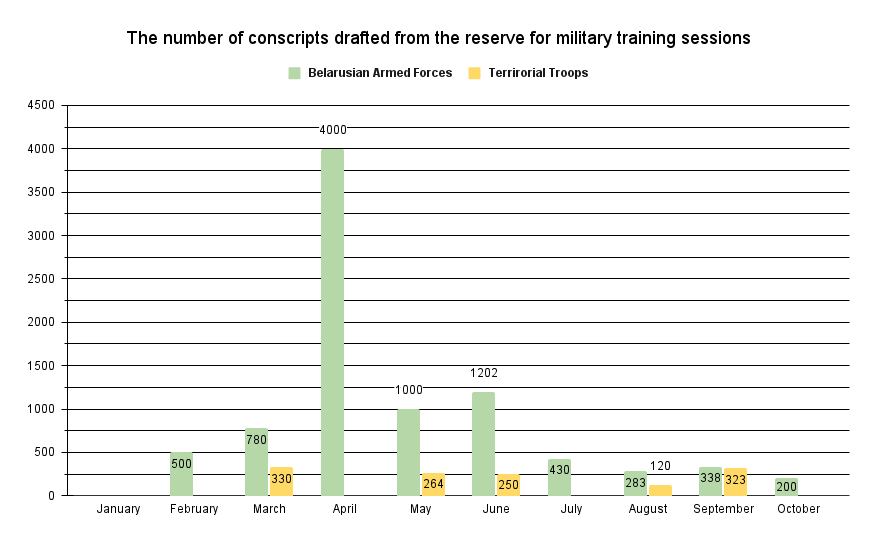
Thus, the total number of reservists drafted for military training sessions in October can be estimated at no less than 200 people. We note that this is the lowest number of reservists, since we don’t know about all the military training sessions that have been held. In reality, the number of reservists who have passed military training sessions could be several times higher.
In total, at least 10020 people have already been drafted for various types of training sessions from January to October 2023. Earlier, the Ministry of Defense of Belarus reported about its plans to draft 9000 people for training sessions in 2023. Thus, the limit on the draft of reservists for training sessions has already been exceeded.
We should add that in October it became known that the first criminal case against a reservist for evading participation in a military training session was considered. This is indirect evidence that reservists mostly arrive at military commissariats voluntarily. It should be noted that there were 10 sentences in criminal cases for evasion from military training sessions in 2022 and only 2 in 2021.
1.3. Movements of military equipment and aviation activity.
The intensity of movements of military equipment decreased almost twofold compared to September. The main movements of military equipment were related to the combat readiness inspection (for more details, see paragraph 1.1 of the review). As in previous months, there was nothing unusual about the movements of equipment of the Belarusian Armed Forces. More details on the movements of military equipment are available on the map of military activity.
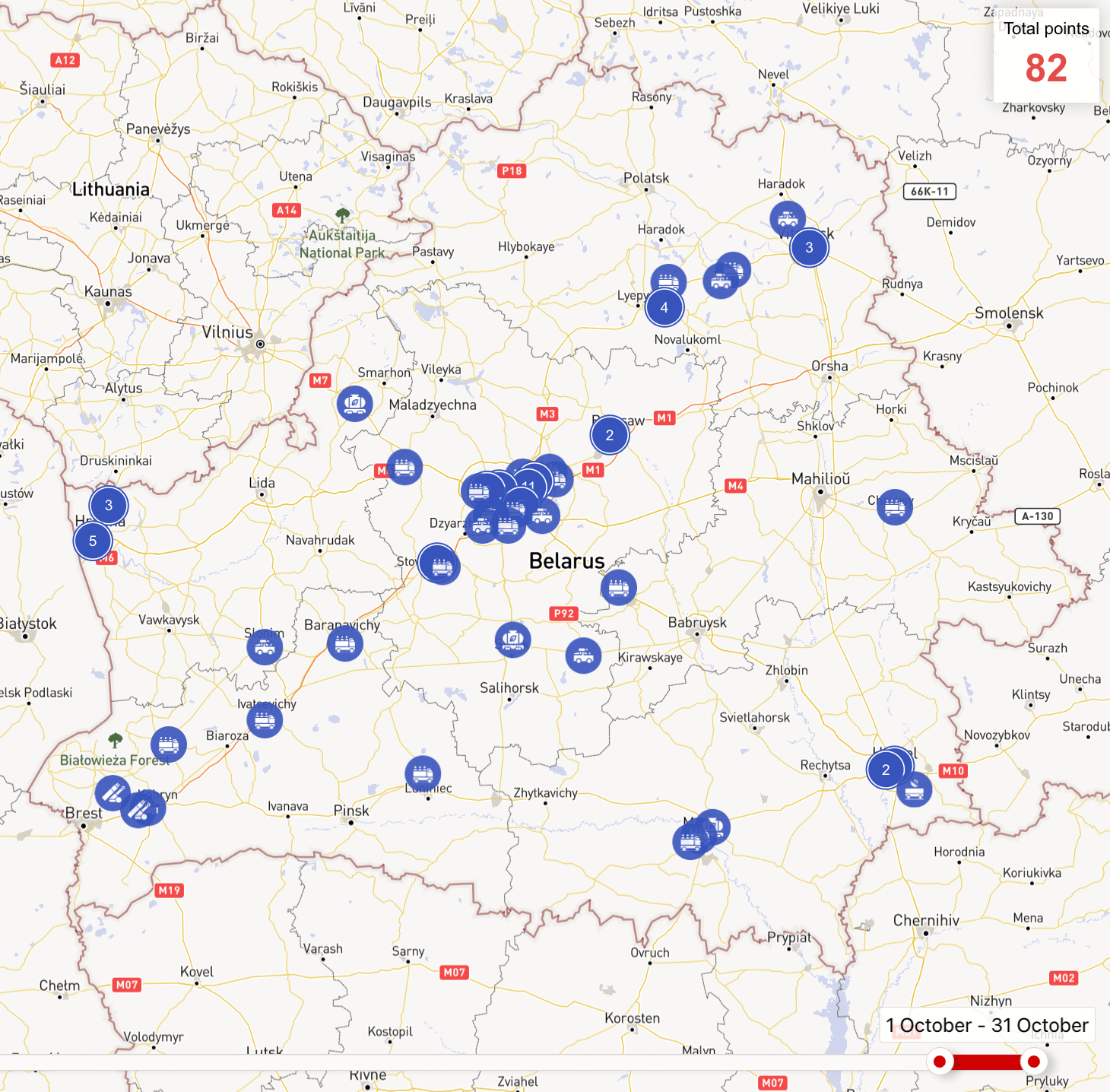
The intensity of movements of the Belarusian Armed Forces by rail decreased twofold compared to September. During the month, movements of units of the Belarusian Armed Forces related to combat training activities were recorded. For example, battalion tactical drills in the 6th Mechanized Brigade, field drills in the 19th Mechanized Brigade, combat readiness inspections involving the 6th Mechanized Brigade, the 19th Mechanized Brigade and the 120th Mechanized Brigade.
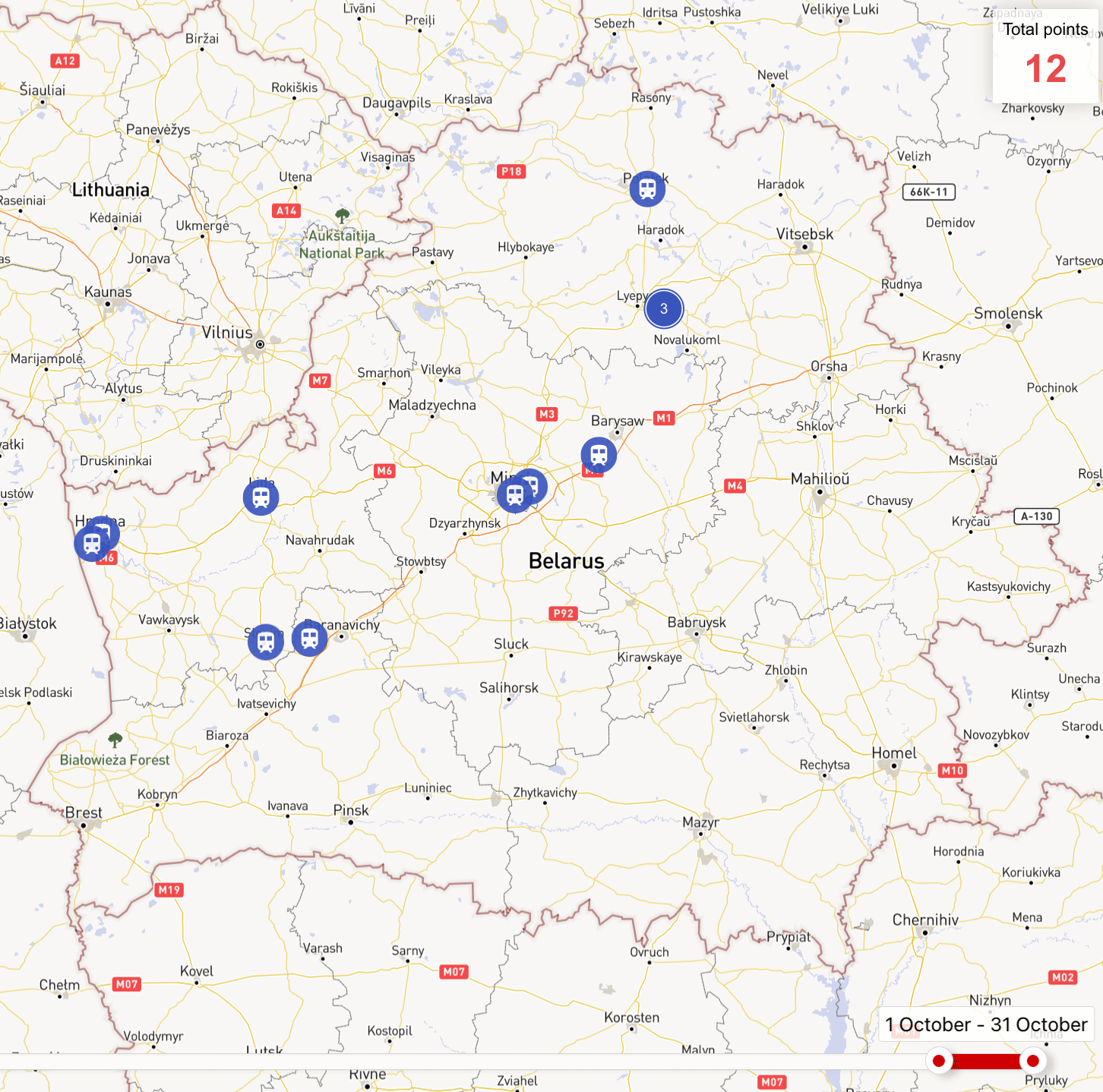
The intensity of flights of the Belarusian Air Force decreased compared to September. Lida, Baranavichy, Machulishchy, Luninets and Barautsy airfields were mainly used for flights. During the flights, the entire helicopter and aircraft fleet of the Belarusian Air Force was involved. There was nothing unusual during the flights.
In October, the repair of the runway at Machulishchy airfield was completed. On October 17, aircraft of the 50th Combined Air Base of the Belarusian Air Force were redeployed from Baranavichy airfield to Machulishchy airfield. We recall that since the beginning of September, the aircraft had been stationed in Baranavichy due to the runway repair at Machulishchy airfield.
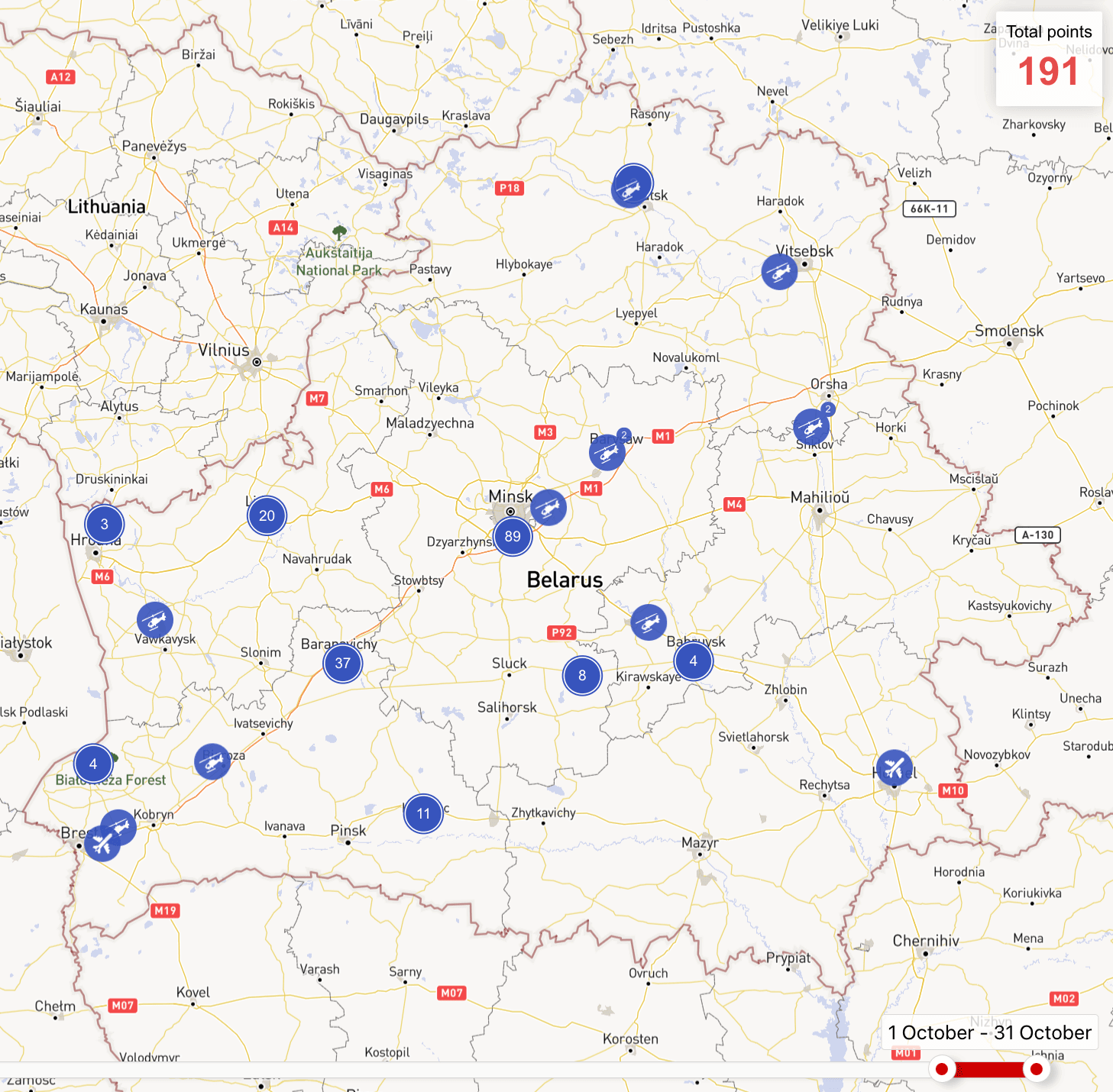
1.4. Military commissariats. Territorial defense and national home guard.
No drills with the territorial defense and national home guard were reported in October. We recall that since the beginning of the year, territorial defense drills have been held in 11 regions of Belarus. About 1287 reservists were drafted from the reserve for these drills.
Other activities to train territorial defense and territorial troops include the following:
1) On October 3-6, mobilization readiness training was held under the leadership of chairmen of regional executive committees. Theoretical and practical events were held in all districts with officials of executive committees and military commissariats. Special attention was paid to the issues of formation of territorial troops, work of reception points for mobilized reservists and equipment.
2) On October 18, mobilization drills were held in Ivatsevichy district. The drills considered the protection of the building of the district executive committee, the work of the national home guard, and the provision of medical aid to the wounded in the local hospital.
3) Servicemen of the 6th Mechanized Brigade held explosives training with officers of the territorial troops of Hrodna and Brest regions.
On October 24, conscripts began to be sent for active military service. According to the information of the Ministry of Defense of Belarus, a total of 10,200 people are drafted for service (200 of them – for service in the reserve). In total, about 60 thousand conscripts were summoned to draft commissions. The announced data confirm the conclusion made earlier. In order to maintain the current level of conscription, the Ministry of Defense applies an extensive approach, where the number of conscripts is achieved by reducing health requirements. Despite this, the analysis of vacancies for service under contract shows that officials are trying to hide the existing problems with understaffing in the Belarusian Armed Forces.
In October, four criminal cases against those who evaded conscription were reported.
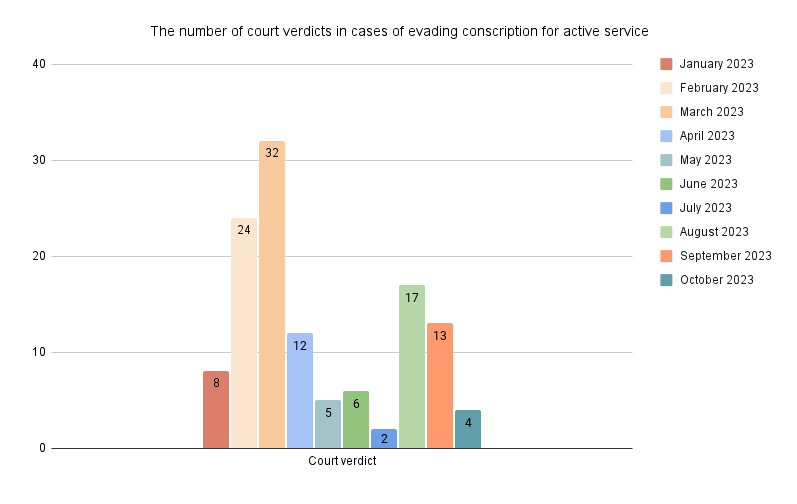
1.5. Supplies of new military equipment to the troops. Activity of the military-industrial complex.
Supplies of new military equipment to the troops.
There were virtually no reports of major supplies of new military equipment to the Belarusian Armed Forces in October. It is only known about the transfer of a batch of new UAZ vehicles to the 927th center for training and use of UAVs.
Activity of the military-industrial complex.
A scientific and practical conference “Current issues of automation of unit management in conditions of active use of unmanned aerial systems and means of combating them” organized by the Military Academy of Belarus was held in Asipovichy. There was an exhibition of modern robotic reconnaissance and EW systems at the conference, as well as training with combat firing and the use of attack and reconnaissance drones.
1.6. Amendments to the legislation in the military sphere.
1) On October 19, the draft law “On amending laws on ensuring national security” was published. The document stipulates tougher liability for those who evade military duty. The draft law also stipulates a number of other measures of mobilization nature. In general, the measures taken demonstrate the continuing militarization of Belarus.
2) On October 26, the agreement between Belarus and Russia on the establishment and functioning of combat training centers for joint training of the armed forces was submitted to the State Duma of Russia for ratification. We recall that the agreement was ratified by Belarus in July 2023. The agreement regulates the establishment and operation of combat training centers in military units in Belarus and Russia, defines their main tasks and the order of interaction between the Defense Ministries. The decision to establish the training centers was made in March 2021.
1.7. International cooperation.
1) On October 10-12, the 23rd meeting of the Belarus-Russia Intergovernmental Commission on Military-Technical Cooperation was held. The issues of current interaction and promising projects of cooperation in the military-technical sphere were discussed at the event. As a result of the meeting, the final protocol, two contracts and a road map for the implementation of projects in the military-technical sphere were signed. The content of the documents was not disclosed.
2) On October 18, representatives of the Belarusian Armed Forces took part in a meeting of the Coordination Committee of the Chiefs of Communications of the Armed Forces of the CIS member states. At the event, the participants discussed the implementation of the Agreement on the Joint (Unified) Communication System of the Armed Forces of the CIS member states of May 29, 2020.
3) On October 18, a meeting of the joint board of the Russian and Belarusian Ministries of Defense was held in Moscow. The board discussed the activities of combat training centers, the regional group of troops, etc. As a result of the meeting, a cooperation plan for 2024 was signed.
4) On October 24, Minister of Defense Viktor Khrenin met with CSTO Secretary General Imangali Tasmagambetov. During the meeting, the parties summarized the interim results of the implementation of measures envisaged for the period of Belarus’ chairmanship in the CSTO.
5) On October 26, the Belarusian delegation headed by Minister of Defense Viktor Khrenin went to China with an official visit. At the meeting of Khrenin with Zhang Youxia, the Vice Chairman of the Central Military Commission of China, they discussed the elaboration of a “road map” for the development of bilateral military and military-technical cooperation, military personnel training, etc.
Khrenin also took part in the 10th Xiangshan Security Forum. In his speech, he repeated a standard set of anti-Western narratives of Russian and Belarusian propaganda. A bilateral meeting of Khrenin with Yahya Rahim Safavi, the Chief Advisor to the Commander-in-Chief of the Iranian Army, was held at the forum. The parties discussed the issues of bilateral military cooperation. The Belarusian delegation also visited the National Defense University and one of the military units of the Chinese army.
It should be noted that Chinese Defense Minister Li Shangfu visited Belarus in August 2023.
1.8. Tactical nuclear weapons in Belarus.
The following information regarding the deployment of TNWs in Belarus was received in October:
1) On October 18, the Russian Sputnik propaganda outlet published a post on social networks about TNWs in Belarus. The following paragraph should be especially noted (quote): “Russia also handed over special ammunition for the Iskander-M missile systems, Su-24M frontline bombers and re-equipped Su-25K attack aircraft, which can also potentially be equipped with nuclear warheads, to the Belarusian military.”
Based on the analysis of available information, we may assume that the mentioning of the Su-24M aircraft in the publication as a carrier of TNWs transferred to Belarus is a technical error. For more details, see the brief “Is the Su-24M bomber a carrier of tactical nuclear weapons transferred to Belarus?” dated October 20, 2023.
2) Information about the discovery of a hangar for the Iskander missile system and for storing “Russian nuclear warheads” in Asipovichy district was spread in the media. We should note that it became known about the construction of the hangar back in July.
2. Armed Forces of the Russian Federation
2.1. Russian group in Belarus.
The situation with the Russian Armed Forces group in Belarus didn’t change in October. There was no redeployment of military contingents to Belarus during the month. There are no grounds to believe that the Russian Armed Forces will start arriving in Belarus in the near future. At the same time, it is possible that if a new wave of mobilization is announced in Russia, the infrastructure of the Belarusian Armed Forces will be used again to train mobilized Russians.
In July 2023, the Ministry of Defense of Belarus announced the upcoming arrival of a “new shift” of the Russian military to the training grounds in Belarus for joint combat training. However, as of early November, this didn’t happen.
We note that in Belarus, Russian military are still stationed at Mazyr (Bokau) and Ziabrauka airfields. As of early October, the following military equipment and objects of the Russian Armed Forces were stationed at Mazyr (Bokau) airfield:
- 8 launchers of S-300/400 SAM system and their 4 mockups;
- 1 96L6E all-altitude detector on the 40V6 universal mobile tower;
- 1 76N6 radar on the 40V6M universal mobile tower;
- 1 92N6 radar;
- 1 91N6 surveillance and tracking radar;
- 1 radar of unidentified type;
- 1 Pantsir-S1 self-propelled anti-aircraft gun and missile (SPAAGM) system;
- more than 10 vehicles;
- about 11 tents (M-30), etc.
The number of equipment and their locations have remained practically the same. The total number of the Russian military who may be stationed at the airfield is 200-300 people.
Also, Russian military continue to operate the Baranavichy radar station and the Russian Navy’s 43rd communication center in Vileika.
Thus, as of November 1, the number of Russian military personnel stationed in Belarus didn’t change and can be estimated at about 2000 people. Of these:
- from the regional group of troops – 0;
- at Mazyr (Bokau) and Ziabrauka airfields – 500-600 people;
- at the Baranavichy radar station and the Russian Navy’s 43rd communication center in Vileika – up to 1450 people.
2.2. Movements of military equipment and aviation activity.
The intensity of movements of military equipment by public roads remained almost the same as in September. We can state that due to the decrease in the number of Russian military in Belarus, only single movements of equipment of the Russian Armed Forces are recorded. A significant part of them was detected in the vicinity of Mazyr, where Russian military are deployed (for details, see paragraph 2.1 of the review). More details on the movements of military equipment are available on the map.
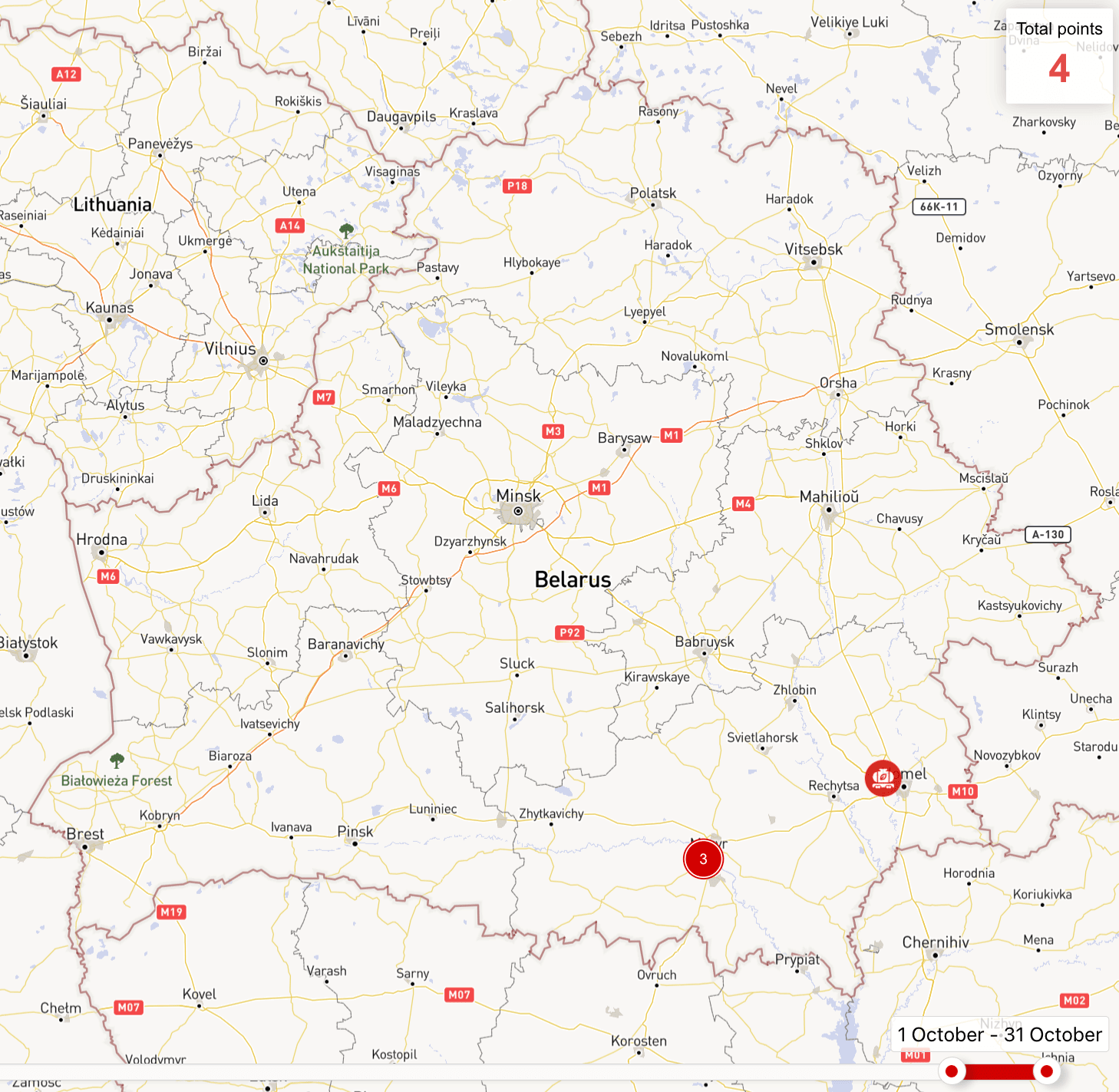
There were no movements of the Russian Armed Forces by rail recorded in October. This is primarily explained by a significant reduction in the number of the Russian group stationed in Belarus.
Aviation activity of the Russian Aerospace Forces decreased insignificantly in October compared to September.
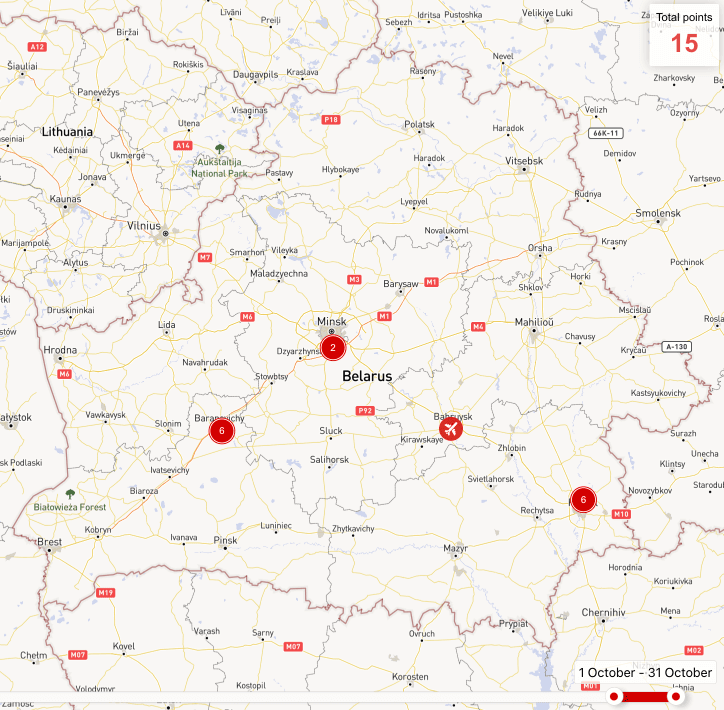
As of November 1, the following aircraft of the Russian Aerospace Forces are permanently stationed on the territory of Belarus:
- at Lida airfield – one Su-25 attack aircraft, which has been at the airfield since August 31;
- at Baranavichy airfield – two Su-24M/MR aircraft and at least one Su-30SM fighter.
Thus, the aviation group of the Russian Aerospace Forces in Belarus increased compared to September. According to our information, Su-24M/MR and Su-30SM aircraft could have arrived in Belarus in early October. The aircraft were seen in a video taken by the VoyenTV TV company at Baranavichy airfield approximately on October 10, 2023. This additionally confirms the presence of the aircraft in Belarus.
According to NOTAMN O0618/23, the flight restriction zone in the regions of Belarus bordering Ukraine was extended until December 31, 2023. The ban is imposed for all types of civil aircraft (including UAVs) at altitudes from 0 to 19,800 meters. The ban on flights over the southern regions of Belarus was introduced on February 24, 2022. Therefore, the threat of missile strikes against the territory of Ukraine from Belarus’ airspace remains at least until the end of 2023.
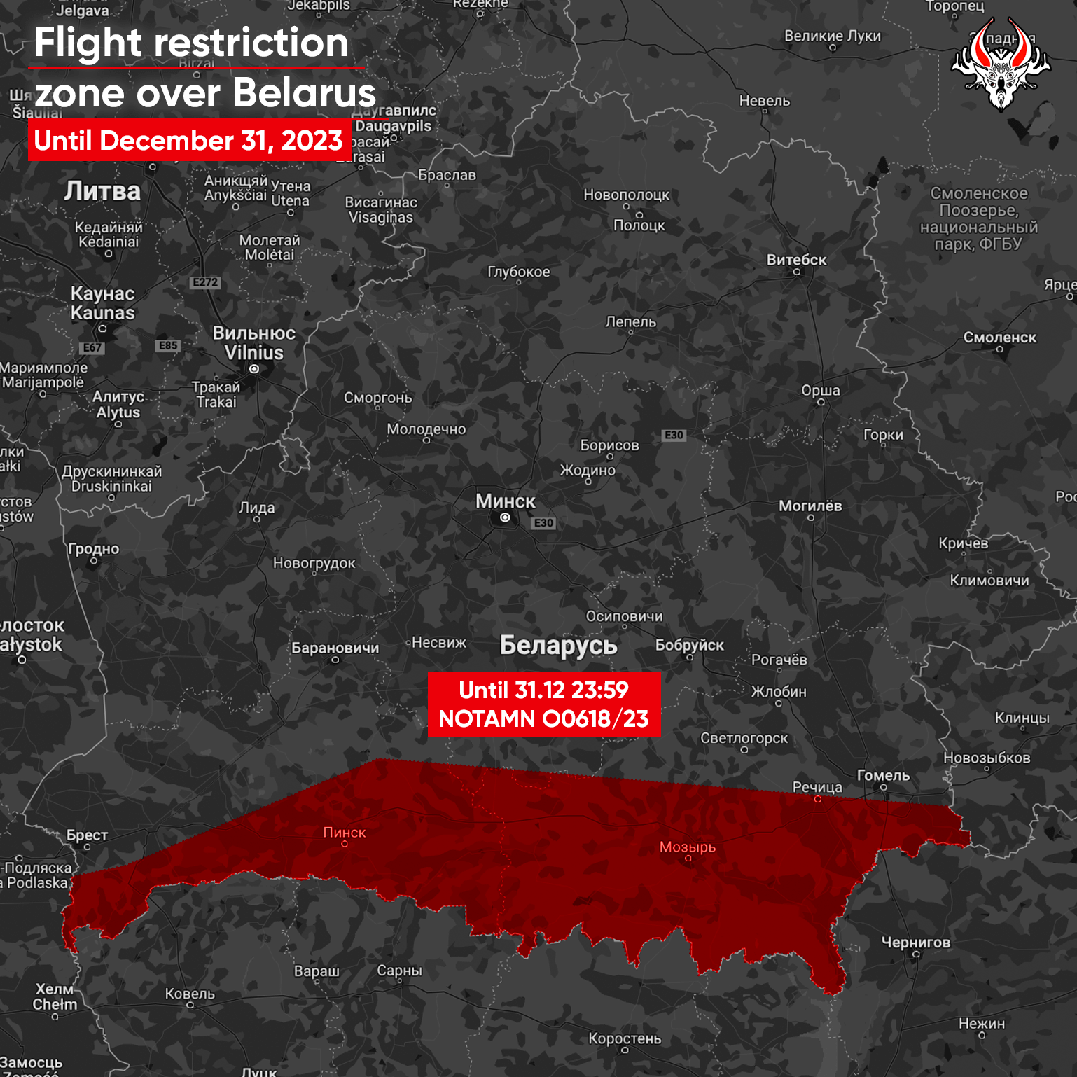
Military transport aircraft of the Russian Aerospace Forces and aircraft linked to PMC Wagner kept arriving at the airfields of the Belarusian Armed Forces and civilian airports:
Baranavichy airfield: passenger – 1 An-148, transport – 1 An-72;
Machulishchy airfield: passenger – 1 Tu-134, transport – 1 Il-76;
Homiel airport: passenger – 1 Beech C90GTi King Air linked to PMC Wagner, transport – 2 An-12;
Babruisk airfield: transport – 1 Il-76.
As can be seen in the chart below, the number of arrivals of military transport aircraft of the Russian Aerospace Forces in Belarus was the lowest since November 2022.
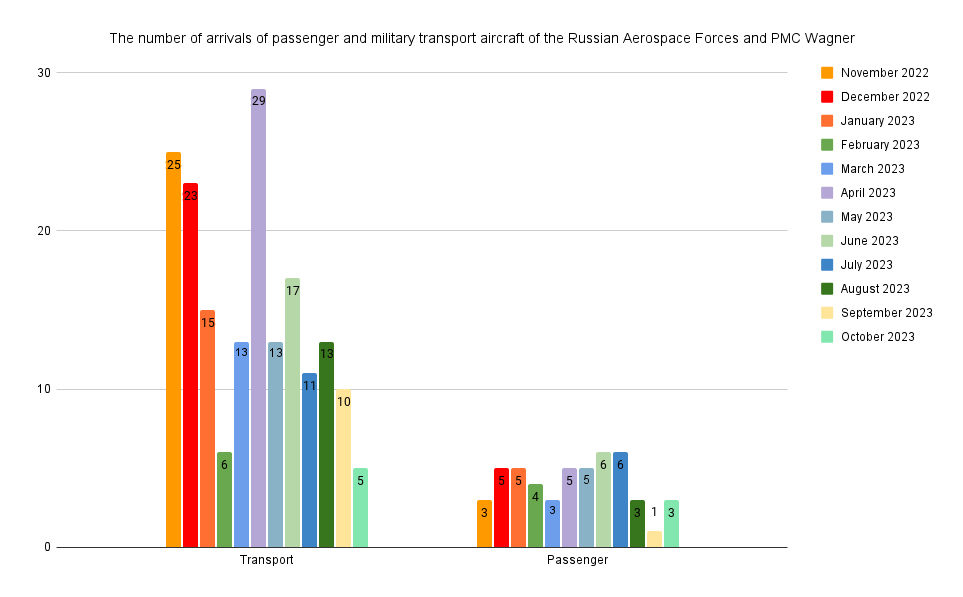
During the month, we recorded arrivals of 2 An-12 military transport aircraft of the Russian Aerospace Forces at Homiel airport. The dynamics of arrivals of the Russian Aerospace Forces aircraft at Homiel airport since August 2022 can be seen in the chart below
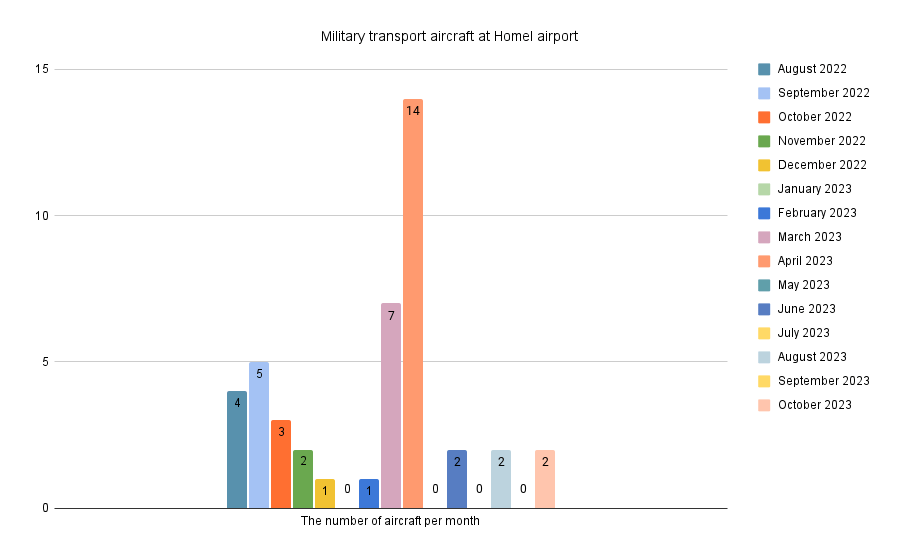
3. Wagner private military company.
In general, the situation with mercenaries in Belarus hasn’t changed significantly.
As of early October, 99 tents, or 34% of their initial number, were left in the field camp of PMC Wagner in Tsel village. Also, about 1040 pieces of equipment (mainly cars) were left in the camp.
Earlier, we assumed that due to the dismantling of tents and the coming autumn, some of the mercenaries may be redeployed to former barracks on the territory of the camp, and it seems to have happened. This may be evidenced by insignificant repair works in the barracks and due to the lack of chimneys above the remaining tents from the stoves, which are used for their heating. From this we can conclude that some of the mercenaries of PMC Wagner continue to stay in the camp in Tsel village. The construction of new field camps for mercenaries in other regions of Belarus was not detected.
Satellite images as of late October show that vehicles are still in the camp and a small number of tents may have been dismantled.
The intensity of training of Wagner mercenaries with units of the Belarusian Armed Forces is still low and not systematic. In turn, we can note active and systematic interaction of the mercenaries with the Internal Troops (for details, see paragraph 1.1 of the review).
During the month, aviation activity of aircraft linked to PMC Wagner was recorded. For example, on October 12, an Il-76 transport aircraft (RA-76370) of the Russian Abakan Air cargo airline arrived at Babruisk airfield. The aircraft stayed in Belarus for more than a day and flew to Mali via Tunisia. According to the media, about 1000 mercenaries of PMC Wagner are stationed in Mali, helping the local military junta. And pro-Wagner Telegram channels publish photos and videos of the participation of the mercenaries in combat operations in Mali. There is every reason to believe that the arrival of the Il-76 aircraft was related to the activities of PMC Wagner. We may assume that the aircraft was transporting mercenaries from Belarus to Mali. This is the first such flight recorded, which could really have taken some mercenaries from Belarus to Africa.
On October 31, one of the aircraft linked to PMC Wagner arrived at Homiel airport from St. Petersburg. The aircraft stayed at the airport for 6 hours and 50 minutes. The purpose of the aircraft’s arrival is unknown.
No active movements of PMC Wagner mercenaries on the territory of Belarus were recorded. According to our estimates, there may be about 500 mercenaries of PMC Wagner in Belarus.
Amid the information that PMC Wagner became a unit of Rosgvardia and recruitment was resumed, we may assume that the number of the mercenaries in Belarus will decrease. Some of the mercenaries will return (or have already returned) to Russia to participate in combat operations, while some mercenaries could fly from Belarus to Africa. Despite the entry of PMC Wagner into the structure of Rosgvardia, it is noted that the “Belarusian direction” will remain.
As for the mercenaries staying in Belarus, we may assume the following prospects of their presence in the country:
Some of the mercenaries will remain in Belarus and will integrate into the security forces of the Lukashenko regime as full-time instructors. Earlier, former employees of Ukrainian police units were recruited into the security forces in the same way.
Some of the mercenaries will return (have already returned) to Russia to participate in combat operations. It is possible that an additional motivation to return to Russia will be the transfer of PMC Wagner to the structure of Rosgvardia.
Some of the mercenaries left (will leave) Belarus for Africa to participate in combat operations. As noted above, there is every reason to believe that at least one aircraft with mercenaries could have flown from Belarus to Mali.
In light of recent events, we can expect an outflow of the mercenaries and their equipment concentrated in Tsel village. This conclusion can be drawn from the information about difficulties with vehicles in the Russian Armed Forces.
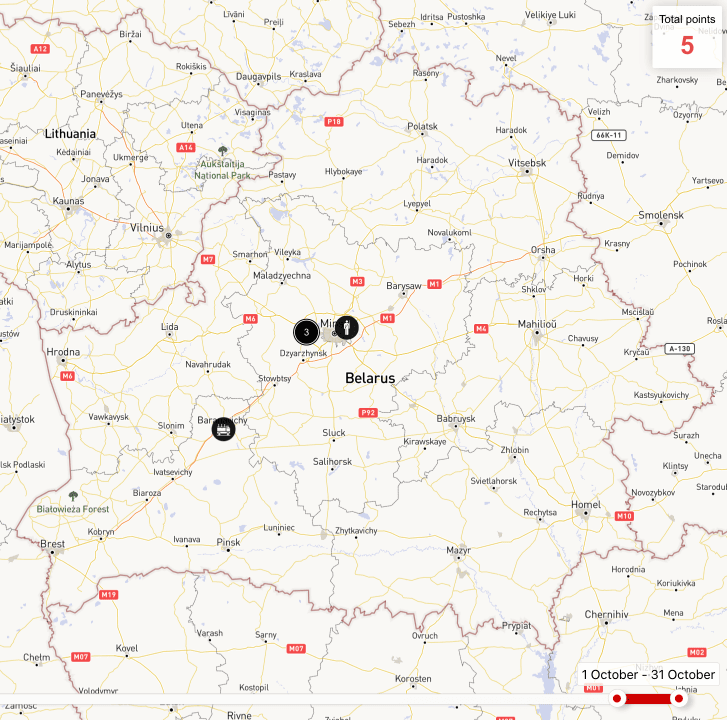
4. General conclusions
- In October, one of the main events in the activities of the Belarusian Armed Forces was a sudden combat readiness inspection, which primarily involved mechanized units of the Belarusian Armed Forces.
Another important and cyclical event is the new conscription into the army, as well as the dismissal of military personnel who have completed their term of service. Therefore, the Belarusian Armed Forces will focus on the training of new recruits in November, as well as summarizing the results of the 2022/23 academic year.
We may assume that there will be no major drills in the Belarusian Armed Forces in November. An increase in activity should be expected in December, when the Belarusian Armed Forces start a new academic year.
- The general conclusion about the situation of the Russian Armed Forces on the territory of Belarus didn’t change. The deployed Russian units don’t pose a significant threat to Ukraine and other countries bordering Belarus. At the moment, an increase in the number of the Russian contingent in Belarus may occur, for example, if a new wave of mobilization is announced in Russia or as a result of unforeseen and unpredictable events. An insignificant increase in the number of the aviation group of the Russian Aerospace Forces in Belarus is also not threatening, as its number is (so far) much smaller than it was before early August 2023.
The level of activity of the Russian Armed Forces in Belarus can still be characterized as very low.
- All conclusions regarding the prospects for the stay of PMC Wagner mercenaries in Belarus mentioned in the review for September 2023 remain valid. In October, there were a number of events that may contribute to the reduction of the number of mercenaries in Belarus. We are talking about the transfer of PMC Wagner to the structure of Rosgvardia and the probable withdrawal of some mercenaries from Belarus to Mali.
A small number of mercenaries will remain in Belarus, who will serve as instructors and military advisers in the Belarusian Armed Forces, Internal Troops and other security agencies. It is possible that this group of mercenaries may join (or has already joined) the security forces of the Lukashenko regime.
In general, the level of activity of PMC Wagner in Belarus can still be characterized as low.
